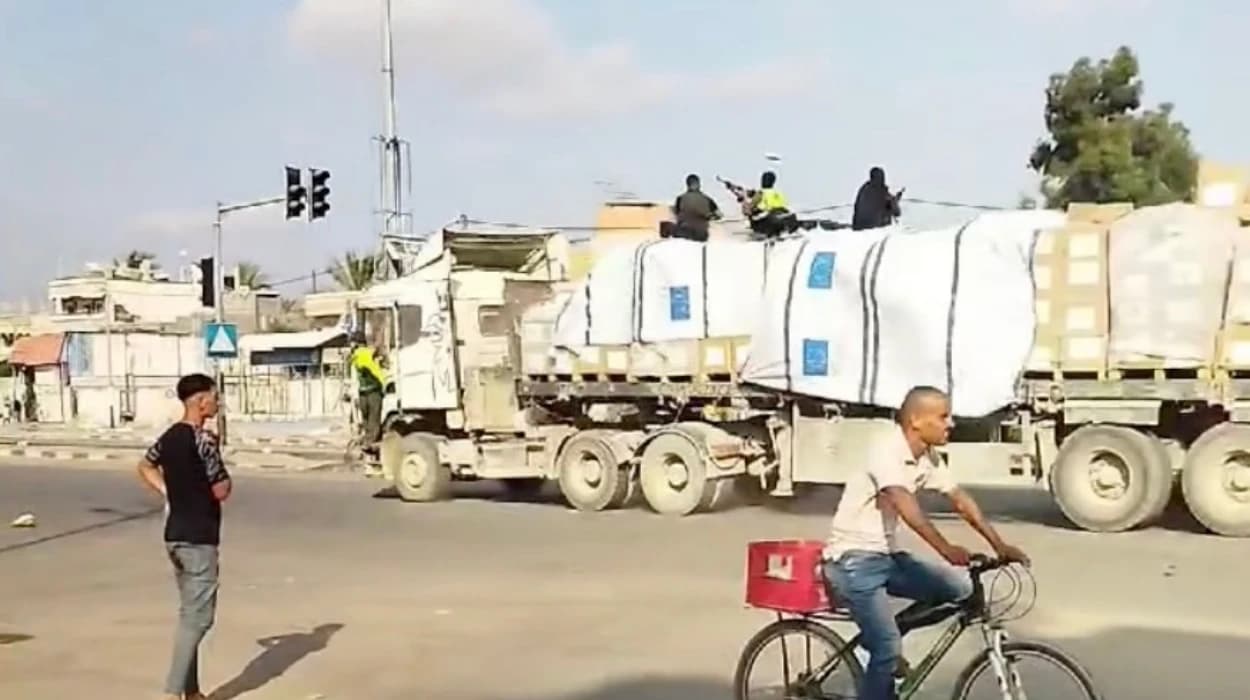In a recent double strike in northern Gaza, Israeli forces
targeted aid security teams waiting at a key crossing, resulting in the deaths
of five aid workers and injuries to others. This attack highlights ongoing
risks to humanitarian personnel amid the escalating conflict in Gaza.
Israeli Double Strike Targets Aid Security Teams in Northern Gaza
As reported by Madamasr, Israeli surveillance
aircraft launched two consecutive strikes on an aid security team waiting at
the Zikim crossing in northern Gaza. This location is a critical entry point
for aid trucks delivering humanitarian assistance, but the team was hit while awaiting
the arrival of supplies. The attack resulted in the deaths of five members of
the aid security teams, intensifying concerns about the safety of humanitarian
workers operating in the region. The timing and location underscore the
vulnerability of those facilitating aid in Gaza during ongoing hostilities.
Casualties Include Aid Workers from International Humanitarian Groups
According to a statement from the Istanbul-based
international humanitarian organisation IHH, five aid workers who were
collaborating with the UN World Food Programme (WFP) were killed in recent
Israeli attacks over the past two days in Gaza. Two others sustaining serious
injuries. The organisation condemned what it described as a “heinous attack”
targeting humanitarian workers who risk their lives daily to provide aid to
Gaza’s oppressed population. The deceased workers were identified as Mohammed
al-Mubayyid, Ahmed Bustan, Mutaz Rajab, Jamal al-Mubayyid, and Ishaq al-Tayf.
IHH offered condolences to their families and emphasised the ongoing peril
faced by aid teams amid the Israeli military operations (Anadolu Agency).
Context of Ongoing Attacks on Aid Workers and Rescue Personnel
The strike is part of a disturbing pattern of violence
against aid workers in Gaza. Human Rights Watch has documented at least eight
strikes on aid workers' convoys and premises by Israeli forces since October
2023, despite aid groups providing their coordinates to Israeli authorities for
protection. The failure of coordination mechanisms often leaves humanitarian
personnel exposed during military operations, with at least 31 aid workers
killed or injured in these incidents, according to Human Rights Watch data from
earlier in the conflict.
Moreover, investigations by independent media outlets such
as +972 Magazine revealed a practice known as "double tap" strikes,
used by the Israeli army to repeatedly hit targets and prevent rescue efforts.
These strikes are designed to hit not only initial targets but also paramedics,
rescue teams, and others attempting to aid the wounded, frequently resulting in
further casualties among civilians and humanitarian workers.
World Central Kitchen Workers Among Victims in Gaza
Adding to the toll on humanitarian teams, an Israeli
airstrike on a vehicle in Khan Younis in southern Gaza killed five people,
including employees of World Central Kitchen (WCK), a major international food
relief organisation. The strike marked the third lethal incident involving WCK
personnel this year. The charity, founded by celebrity chef José Andrés, is
known for providing emergency meals in conflict zones and natural disasters. It
expressed heartbreak over the loss and announced a suspension of operations in
Gaza while seeking more information. Israeli officials claimed the strike
targeted a militant disguised as a WCK worker, an assertion the charity denied,
stating it had no knowledge of any link between the victims and militant
groups.
Additional Attacks on Palestinian Red Crescent and Journalists
Humanitarian organisations continue to be targeted or caught
in the crossfire. The Palestine Red Crescent Society reported that Israeli
military actions hit its headquarters in Khan Younis, killing one staff member
and injuring three others. The organisation emphasised the deliberate nature of
the strike, highlighting that its premises are clearly marked with the
protective Red Crescent emblem and recognised under international humanitarian
law. Israeli authorities have not provided a response to these allegations.
Meanwhile, an Israeli strike near a hospital in Gaza City
killed five journalists, including four from Al Jazeera. The Israeli military
claimed it targeted a journalist accused of being a Hamas operative, an
accusation denied by Al Jazeera and criticised internationally as an attack on
press freedom during conflict.
International Criticism and Humanitarian Crisis
International concern has grown amid the escalating conflict
and attacks on aid operations. Foreign ministers from 24 countries, including
Australia, France, and Japan, have condemned the humanitarian situation in
Gaza, urging Israel to allow unrestricted aid access due to the catastrophic
levels of food insecurity and suffering. The United Nations has reported that
despite the limited and irregular entry of aid, many Palestinians perish while
attempting to obtain food at distribution points, some even due to stampedes or
military fire. UN relief agencies continue to highlight the massive shortfalls
in daily required food and medical supplies versus what actually reaches Gaza.
The Strategic and Human Costs of the Strikes
The Israeli military's operations in Gaza have involved a
complex balance of targeting militant groups while managing international
criticism for the impact on civilians and aid workers. The use of "double
tap" strikes, denial of safe passage for ambulances and aid convoys, and
repeated attacks on humanitarian premises deepen the crisis. Aid organisations
report recurring failures in coordination mechanisms meant to protect their
personnel. Palestinian health sources report hundreds of casualties among those
trying to access vital aid services.
Israeli officials justify some strikes by alleging militants'
presence among aid workers or misuse of humanitarian logos. These assertions
remain contested by the humanitarian groups and independent observers, who warn
these justifications place all aid workers at increased risk.
This double strike on aid security teams in northern Gaza represents the tragic and dangerous intersection of armed conflict and humanitarian crisis, underscoring the urgent need for protection of humanitarian personnel and unrestricted access for aid to the civilian population of Gaza.
